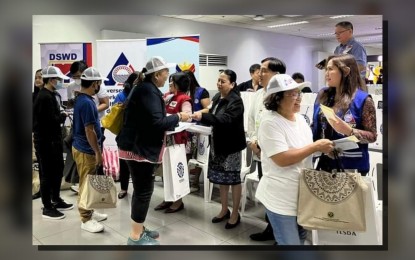
LEGAL AID. The 6th batch of overseas Filipino worker (OFW) returnees from Israel arrive at the NAIA Terminal 3 on Tuesday (Nov. 7, 2023). The House of Representatives on Wednesday (Nov. 29) approved House Bill 9035 expanding the legal aid to overseas Filipinos and OFWs. (Photo courtesy of DMW)
MANILA – Speaker Martin Romualdez on Thursday said the measure expanding the scope of legal aid to overseas Filipinos and overseas Filipino workers (OFWs) would protect them at all stages of the legal proceedings from investigation to trial proper and beyond.
"Our overseas Filipinos are our modern-day heroes. Their immeasurable contributions to our country, their families, and communities merit the utmost protection from the government," he said.
Romualdez said House Bill 9035 would expand the use of the Legal Assistance Fund (LAF) and the Agarang Kalinga at Saklolo Para sa mga OFWs na Nangangailangan (AKSYON) Fund to be managed by the Department of Foreign Affairs (DFA) and the Department of Migrant Workers (DMW), respectively.
The LAF, he said, shall be made available from the time of the investigation, detention, arrest or indictment of the overseas Filipinos all the way to the trial proper, and at all levels of appeal thereafter.
The bill was overwhelmingly approved on third and final reading by the House during its plenary session on Wednesday with 246 affirmative votes.
The bill seeks to amend Section 26 of Republic Act (RA) 8042, or the “Migrant Workers and Overseas Filipinos Act of 1995,” to expand the scope of the LAF from being utilized only for legal aid to “consular assistance” for overseas Filipinos.
The bill provides that the expenditures to be charged against the Legal Assistance Fund shall include the fees for the foreign lawyers to be hired to represent overseas Filipinos facing charges, expenses for the filing of labor and/or criminal cases against erring or abusive employers or other persons abroad, bail bonds to secure the temporary releases and other litigation expenses.
In countries with no DMW offices yet, the DFA is mandated to extend legal and other forms of assistance to OFWs in said areas.
As for the AKSYON Fund, HB 9035 amends Section 14 of RA 11641, or the “Department of Migrant Workers Act,” to expand the coverage of the AKSYON Fund for OFWs.
The expenditures to be charged against the AKSYON Fund shall be similar to the fees covered by the LAF.
The hiring of foreign legal counsels and other releases of funds for other expenses related to the mandate prescribed under the measure, “when circumstances warrant urgent action", shall be exempt from the coverage of RA 9184 or the Government Procurement Act.
Financial literacy course
The House also unanimously approved on the third and final reading House Bill (HB) 9292 mandating the inclusion of a personal financial literary course in the Technical-Vocational Education and Training (TVET) curriculum of technical vocational institutions (TVI) and Technical Education and Skills Development Authority (TESDA) training centers.
Romualdez emphasized the urgency to enact a measure that would broaden the opportunities and venues for teaching a personal literacy course vital to strengthen financial education among Filipinos.
"Financial literacy is a precious skill that, unfortunately, few have. Filipinos who are financially literate are more likely to avoid financial frauds, develop financial discipline, use debt responsibly, and save their money for education or retirement," he said.
The bill seeks to equip the students with basic knowledge and additional skills in wealth management and contingency planning, especially in properly handling their finances, prepare them to make well-informed financial decisions upon entering the workforce, and help them master financial literacy as an essential life skill in their day-to-day transactions and other activities.
Under the bill, TVIs and TESDA training centers shall provide the necessary financial education to tech-voc students while helping them learn and develop other practical tech-voc skills and competencies.
The bill provides that financial education shall focus solely on personal finance based on the policies, guidelines, and standards set jointly by the TESDA, the Bangko Sentral ng Pilipinas (BSP), Department of Finance (DOF), Securities and Exchange Commission (SEC), and the Insurance Commission (IC). (with a report from Zaldy De Layola/PNA)
